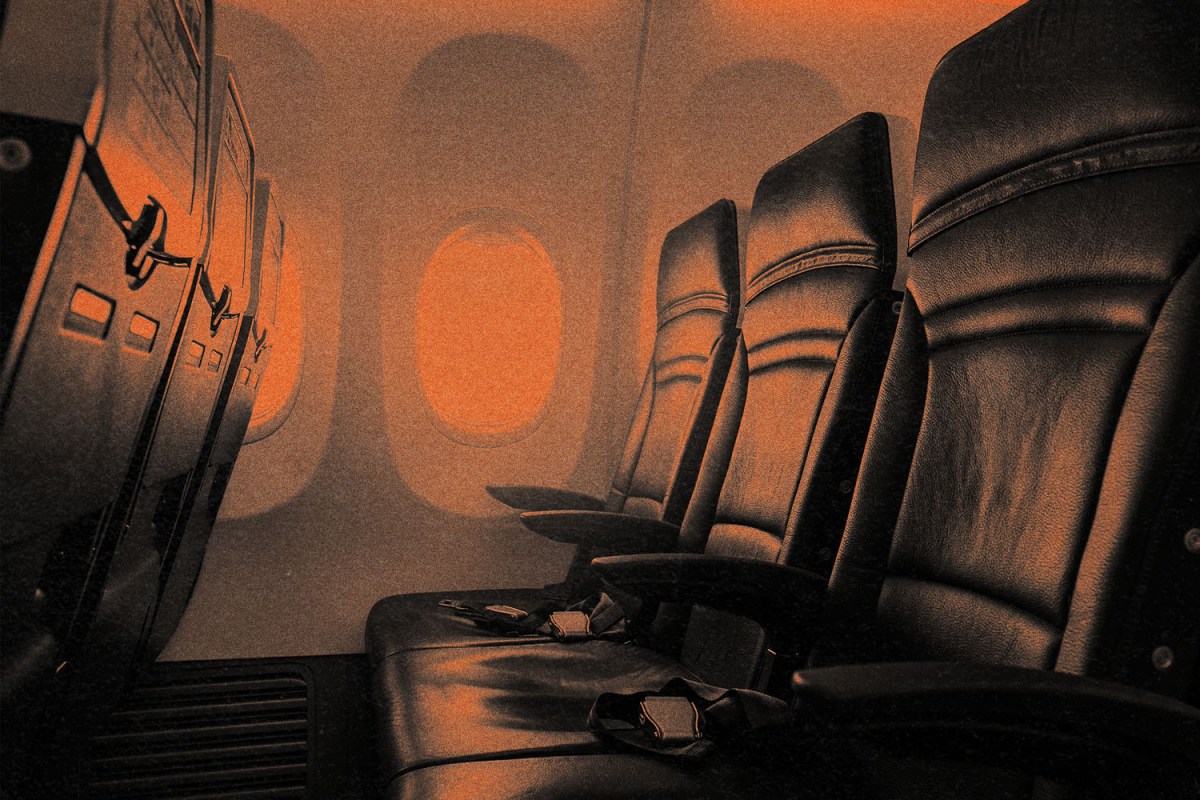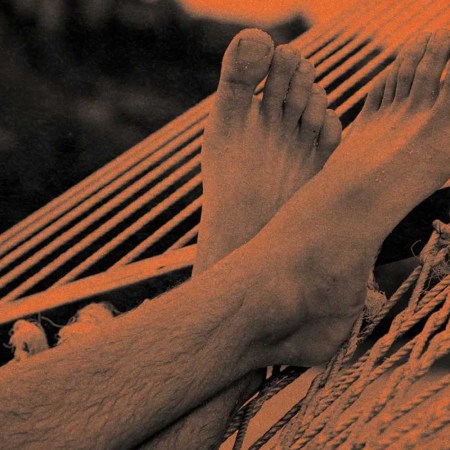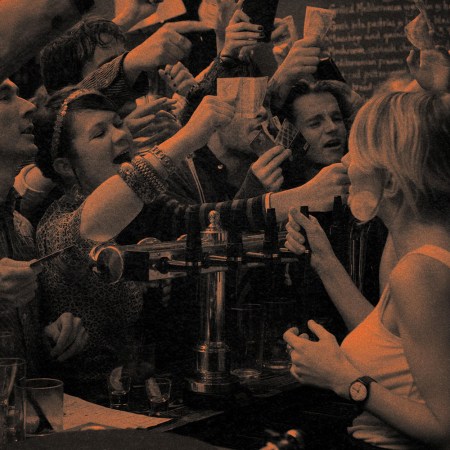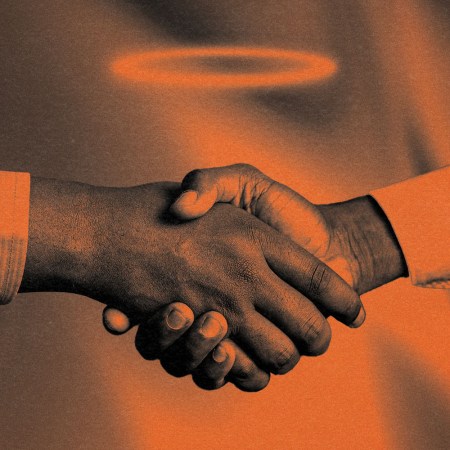At some point this year — probably June or July, according to most state legislators — coronavirus restrictions will ease and we will all re-emerge, like bears from their slumber, into polite society. To help you readjust, we’re sharing some advice on grooming, fitness, getting dressed in something besides sweatpants (but also sweatpants), how to manage your stress and mental health, dating, concert and bar etiquette, and more.
As elderly Jud Crandall tells his neighbor Louis Creed in Stephen King’s Pet Sematary, “Sometimes, dead is better.”
It’s a sentiment that applies to any number of customs, norms, activities and innocuous little details of everyday life that COVID-19 temporarily eradicated. And while the majority of them will likely re-enter our lives very soon, we’d be totally fine with some remaining gone on a permanent basis. Here, in no particular order, are 12 such things.
1. Pressure to Make Small Talk in Public
In addition to making it more difficult to catch coronavirus, wearing a face mask makes it harder to have idle chitchat with people you run into in public, and thus many of us have simply stopped having non-vital conversations. Instead of a stop-and-chat with a neighbor that goes on a moment too long, a nod and a smile suffices. That perpetually forced conversation with the casual acquaintance you met at that thing that time has been replaced by a friendly wave and a perfectly socially acceptable street cross. Small talk, as we knew it, has vanished.
2. All-You-Can-Eat Buffets
In its official list of considerations for restaurants and bars to stop the spread of COVID-19, the Centers for Disease Control and Prevention said establishments should “avoid offering any self-serve food or drink options, such as buffets, salad bars and drink stations.” With that recommendation, the CDC eighty-sixed the all-you-can-eat buffet that many Americans have enjoyed but no Americans have needed for decades. While there’s zero chance that buffets, which are set to re-open in Las Vegas next month, will fail to make a return to gluttonous glory in some places, it’d be better for everyone to skip them in favor of a healthier, less-is-more diet that doesn’t encourage the sort of mindless grazing that leads to obesity (a growing concern due to COVID-19). It won’t happen, but it should.
3. Sitting in the Middle Seat
A constant pain point for frequent flyers with below-average booking skills, sitting in the middle seats on planes became obsolete when airlines began blocking them in order to meet distancing guidelines and make customers more comfortable with the idea of flying in a pandemic. It was fun while it lasted, but most airlines have ended the run of extended elbow room and started to fill their middle seats up with passengers once again. It’s a logical and understandable move from a business standpoint, but it sure was sweet to be guaranteed a window or aisle seat. Despite our wishes, that guarantee is almost assuredly never coming back. “With vaccinations accelerating and travel interest rebounding sharply, it’s more likely that President Biden will dunk a basketball on live TV than airlines will reimpose middle-seat blocking,” Scott Keyes, founder of Scott’s Cheap Flights, told The Washington Post.
4. Apathy for Minimum-Wage Workers
While the frontline healthcare workers fighting the coronavirus were rightfully hailed as heroes early on in the pandemic, it didn’t take long for the essential workers who were playing an equally vital role in keeping people safe and healthy to be recognized for their efforts. For the first time, cashiers, janitors, delivery drivers, grocery stockers and many other essential workers were hailed in the same manner that doctors, nurses and ER staffers have been for years. It would be great if the federal government could give essential workers a lasting show of appreciation by raising the minimum wage, but at least we, as a society, have made some effort to say thanks to people who too seldom heard it before. It would be meaningful if that continues.
5. Overcrowded Animal Shelters
After several years of remaining relatively flat or even declining, the rate at which pets were rescued from shelters increased 12 percent year-over-year in 2020, according to PetPoint. The increase in demand for pets and subsequent drain on supply has led some shelters and humane groups to compete with rescue groups in other parts of the country to bring in animals to be adopted. While it is a problem for the shelters, groups and potential pet parents, it is a good thing for the animals, as it means more of them are ending up in permanent homes. In other words, a good problem to have.
6. Going to Work When You’re Sick
In the before times, a runny nose or sore throat was not always enough to stop someone from heading into the workplace, often taking public transit to get there. Now, after a year of many folks working from home full time, there’s been a societal shift in attitude about going into work while sick. Though a recent survey found one out of 14 workers would go to work if they felt sick — regardless of how severe their symptoms were — the days of sharing an office, let alone a cubicle, with someone who is hacking up a lung are over. And, if for no other reason than potential liability issues, we’re fairly certain they won’t be back.
7. Feeling the Need to Say “Yes” to Everything
While there are obviously some social obligations you should still feel compelled to say “yes” to (and actually show up for), COVID-19 set a precedent for being able to say “no” without feeling remorse or facing ridicule. Now that we know how easy saying “no” can be, we should keep doing it without having to use the pandemic as an excuse (even though it is still an excellent one!). Do you really want to start going to your best friend from college’s roommate’s spoken-word interpretations of musical theater on Tuesday nights again? Thought not. COVID-19 made it socially acceptable to start saying so.
8. All of the Touching of the Hands
While we won’t go so far as to say that handshakes, high-fives and other forms of friendly greeting should vanish completely, the way they’ve been reduced from a flood to a trickle is just fine. Honestly, it was all just a little much. Was it really necessary to shake hands with every single person at a business meeting or endure another awkward high-five from your boss for a job mediocrely done? No. And will anyone be better served if NBA players go back to slapping hands with all of their teammates in between free-throw attempts? Not a soul. (Actually, the players might.) The NHL’s playoff handshake, which never went away, can stay. The majority of the remaining hand stuff can stay on ice.
9. Having to Carry Cash
Already somewhat of a dying breed thanks to the presence of credit cards and the rise of person-to-person payment services like Venmo, cash largely went out of circulation over the course of the last year, as its use required a COVID-19 no-no: touching. With more and more restaurants, stores and other establishments now accepting alternative forms of payment and/or using QR codes to facilitate purchases, the need to carry around actual paper money has nearly vanished. Paper currency will always have its place for purchasing illicit substances, making it rain and procuring goods and services at cash-only establishments, but the need to have grimy greenbacks on hand 24-7 is gone. It isn’t a big one, but it is one less thing to worry about. We’ll take it.
10. Lack of Respect for Personal Space
On the streets, in the subway and in public areas all across New York City, there currently exists something that was never really there before: space. New York has transitioned from a city where there was so little room to maneuver that the subway had to run ads about manspreading into a metropolis where personal space is respected and readily granted. And while self-preservation was the primary reason New Yorkers started to make room for one another on the sidewalk and subway, more than half the city is now vaccinated, and the space remains.
11. Getting in Trouble for Drinking a “Walktail”
Last summer, it was commonplace to see someone walking the streets with a can of beer or cocktail in a plastic cup in hand. Though that practice waned as the weather got colder and people began to retreat indoors, the pandemic-era to-go booze rules that allowed bars and restaurants to sell takeout cocktails have remained in place and, at least for now, are still on the books. Here’s hoping they stay that way.
This article appeared in an InsideHook newsletter. Sign up for free to get more on travel, wellness, style, drinking, and culture.

























